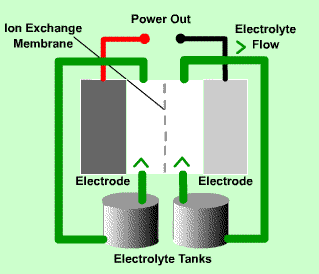Energy Storage: Global Climate Change or Just Cleaner Air?

Hat tip to the Energy Blog for this post on a new book dealing with advances in energy storage technologies. Energy analyst Richard Baxter's "Energy Storage: A Non-Technical Guide", details several newer technologies and their likely impact on the energy industry's shift to cleaner energy generation. Global Warming (Climate Change) and Peak Oil enthusiasts should be following this issue very closely, since in the long run energy storage will have a far greater impact on greenhouse gases and petroleum use than any political movements such as Kyoto or Peak Oil conservation.
 From the Energy Blog:
From the Energy Blog:The 302 page book is divided into six sections with a major emphasis on the technologies as indicated by the following outline:
* How energy storage can benefit the electric power industries
* How energy is stored in the fossil fuel markets
* Energy storage technologies
o pumped hydroelectric storage (PHS)
o compressed air energy storage (CAES)
o flow batteries-vanadium redux, zinc bromine, polysulfide bromide and cerium zinc
o sodium sulfide battery
o lead-acid battery
o nickle cadmium battery
o flywheels
o electrochemical capacitors
o superconducting magnetic energy storage
o thermal energy storage
+ design and operation of each technology
+ history of each technology
+ cost issues for each technology
+ examples of installations for each technology
+ prospects and challenges of each technologies
+ major developers of each technologies
* Applications of energy storage
* The role energy storage can play in renewable energy
* How energy storage could effect future energy development
Forty illustrations make reading and understanding the text much easier. Numerous references in each section and a 12-page bibliography are included for those interested in digging deeper into these technologies.

Energy Blog also points to this article by Baxter in EnergyPulse.

The benefits of using wind energy can be quite high. A number of studies by US Government Laboratories (NREL, LLNL, etc.) have shown that adding wind to a diesel-powered local grid can reduce fuel consumption by 40%-50% and total costs by 30% to 50% for areas with plentiful wind resources.(1) However, because of the small size of these power grids (lack of system inertia, etc.) simply adding wind turbines to small power grids cannot be done haphazardly—a systematic review of the load and potential additional wind turbines must be undertaken to ascertain potential benefits, and to determine what level of wind penetration is best. For many of these power grids, the opportunity exists to have wind resources well in excess of 50% of the peak load.
The same studies that showed that increasing the wind penetration can lower the diesel fuel costs on these systems also showed that adding a storage component can gain an additional 10%-20% in system cost reductions. Although wind turbines provide power with no fuel cost, they bring with them operational characteristics that cause the overall system to operate at sub-optimal conditions many times due to the variability of the wind energy, the non-dispatchability of the wind energy, and the additional system stabilization requirements (frequency and voltage) required. By alleviating some of the stress on the system by operating as a dynamic source and sink for power (a shock absorber), energy storage can be a beneficial additional to these island grids for three general reasons: reducing diesel starts/runtime, providing system stability, and improving the reliability of supply from increasing the level of wind penetration for the system.

The value of energy storage to the system increases as the wind penetration increases, as there will be an increasing amount of time that the available wind power exceeds the total system loads. According to one NREL study(2), at 50% wind penetration, storage can provide 20% greater fuel saving and 20% fewer diesel run-tine than non-storage wind/diesel systems alone.
Here is a website from the Engineering Department of SDSU in San Diego giving a general introduction to the topic of energy storage.
Here is an excellent introduction to large scale energy storage from Imperial College London.

Whether one believes in catastrophic anthropogenic global climate change, or merely wants cleaner air to breathe for the indefinite future, integrating storage technologies into the energy infrastructure is excellent news.
Labels: batteries, Energy Technologies

0 Comments:
Post a Comment
“During times of universal deceit, telling the truth becomes a revolutionary act” _George Orwell
<< Home